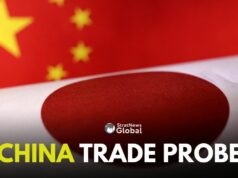The International Monetary Fund has said that global economy is set for modest growth over the next two years amid cooling activity in the U.S., a bottoming-out in Europe and stronger consumption and exports for China, but risks to the path abound.
The IMF warned in an update to its World Economic Outlook(WEO) that momentum in the fight against inflation is slowing.
This could further delay an easing of interest rates and keep up strong dollar pressure on developing economies.
The IMF kept its 2024 global real gross domestic product growth forecast unchanged from April at 3.2% and raised its 2025 forecast by 0.1 percentage point to 3.3%.
The forecasts fail to shift growth from the lackluster levels that IMF Managing Director Kristalina Georgieva has warned would lead to “the tepid twenties.”
But the revised outlook reflected some shifting sands among major economies, with the 2024 U.S. growth forecast reduced by 0.1 percentage point to 2.6%, reflecting slower-than-expected first-quarter consumption.
The Fund’s 2025 U.S growth forecast remained unchanged at 1.9%, a slowdown driven by a cooling labor market and moderating spending in response to tight monetary policy.
“Growth in major advanced economies is becoming more aligned as output gaps are closing,” IMF Managing Director Kristalina Georgieva said in a blog post accompanying the report.
Kristalina added that the U.S. was showing increasing signs of cooling, while Europe was poised to pick up.
The IMF significantly hiked its China growth forecast to 5.0% – matching the Chinese government’s target for the year – from 4.6% in April due to a first-quarter rebound in private consumption and strong exports.
The IMF also boosted its 2025 China growth forecast to 4.5% from 4.1% in April.
CHINA RISKS
But China’s momentum may be sputtering, as Beijing on Monday reported second-quarter GDP growth of just 4.7%, significantly below forecasts amid weak consumer spending amid a protracted property downturn.
Gourinchas told Reuters in an interview that the new data poses a downside risk to the IMF forecast, as it signals weakness in consumer confidence and continuing problems in the property sector.
To boost domestic consumption, China needs to fully resolve its property crisis, as real estate is the main asset for most Chinese households.
On a more positive note, the IMF slightly upgraded its 2024 eurozone growth forecast by 0.1 percentage point to 0.9%, leaving the bloc’s 2025 forecast unchanged at 1.5%.
The eurozone has “bottomed out” and saw stronger first-half services growth, while rising real wages will help power consumption next year and easing monetary policy will aid investment, the IMF said.
It cut Japan’s 2024 growth forecast to 0.7% from 0.9% in April due in part to supply disruptions from a major auto plant shutdown and weak private investment in the first quarter.
INFLATION RISKS REMAIN
The IMF warned of near-term upside risks to inflation as services prices remain elevated amid wage growth in the labor-intensive sector and said renewed trade and geopolitical tensions could stoke price pressures by increasing the cost of imported goods along the supply chain.
Gourinchas said that despite a fall in U.S. consumer prices last month, the Federal Reserve can afford to wait a bit longer to begin cutting rates to avoid any inflationary surprises.
PROTECTIONISM RISKS
The IMF also warned of potential swings in economic policy as a result of many elections this year that could have negative spillovers to the rest of the world.
“These potential shifts entail fiscal profligacy risks that will worsen debt dynamics, adversely affecting long-term yields and ratcheting up protectionism,” the Fund said.
The Fund did not name U.S. Republican Party candidate Donald Trump, who has proposed to impose a 10% tariff on all U.S. imports, nor Democratic President Joe Biden, who has sharply hiked tariffs on Chinese electric vehicles, batteries, solar panels and semiconductors.
But it said that higher tariffs and a scaling up of domestic industrial policy could create “damaging cross-border spillovers, as well as trigger retaliation, resulting in a costly race to the bottom.”
(With Inputs From Reuters)
Delhi based journalist pickled in journalism. Have reported from nine world capitals and almost all parts of India. Over the last three decades, I have worked for India’s mainstream English dailies and contributed to All India Radio, Doordarshan and Women’s Feature Service. Also worked for international media including Japan’s leading newspaper, The Asahi Shimbun and done assignments for The Sunday Times, London, The Telegraph, The Guardian and the Canadian Broadcasting Corporation. Worked in the Embassy of France in New Delhi and can speak French to save my life. Write on Diplomacy, Politics and the social sector. Love Nature, heritage, Nature, animals and vintage cars. Enjoy cycling and playing badminton.





